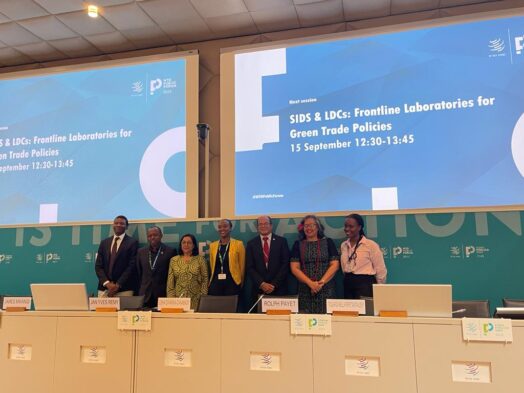By Adiella Lewis
On its website, the World Trade Organization (WTO) describes its annual Public Forum as its largest outreach event, designed to provide a platform to discuss the latest developments in global trade and propose ways to enhance the multilateral trading system.
As indicated by the theme “It Is Time for Action”, this year’s Public Forum – which took place from 12th-15th September 2023 at the WTO’s Headquarters in Geneva, Switzerland – encouraged academics, civil society organizations, and other stakeholders to submit panels examining how trade can contribute to a greener, more sustainable future, facilitate access to environmental goods, services, and technologies, and help achieve the Paris Agreement’s Nationally Determined Contributions and maintain the ambition to limit global warming to 1.5 degrees above pre-industrial levels.
Since climate change is one of the most critical issues of our time, participation in the 2023 Public Forum was especially important for representatives of developing countries and Least Developed Countries (LDCs) as it presented an invaluable opportunity to present their concerns and solutions to the approximately 3,400 participants in attendance.
So when the WTO’s call for proposals was announced earlier this year, the SRC considered it a crucial opportunity to present the perspectives of Small Island Developing States (SIDS) and Least Developed Countries (LDCs) as “front line” laboratories for advancing the green trade agenda. The proposal, prepared by SRC research assistants Adiella Lewis and Russell Campbell, under the supervision of SRC Director Dr. Jan Yves Remy, was the first ever submitted by the SRC to the Forum. It was designed to bring together representatives from the smallest and most vulnerable countries to climate change and highlight their unique stories, as well as the challenges and opportunities they face in forging trade policies that are conducive to their resilient development.
To share these stories, the SRC was privileged to gather a stellar group of panelists to be moderated by SRC Director, Dr. Jan Yves Remy, namely, Ambassador Usha Dwarka-Canabady, the Ambassador and Permanent Representative of the Embassy of Mauritius, James Mwangi, Founder of Climate Action Platform – Africa, Rolph Payet, Executive Secretary of the Basel, Rotterdam, and Stockholm Convention Secretariat and former Seychelles’ Minister of Environment and Energy, and Ambassador Toleafoa Nella Pepe Tavita-Levy, the Ambassador and Permanent Representative of the Permanent Mission of Samoa.
The panelists shared the individual approaches taken by their countries and regions to address issues such as renewable energy, waste management, sustainable business practices, and single-use plastics and examples of creative, people-centered approaches to the green transition.
These interventions, which reflected on the experiences of policymakers, academics, innovators, and entrepreneurs in these “frontline laboratories”, highlighted the progress made by SIDS and LDCs in developing green trade policies.
The SRC was also involved in two other Public Forum panels; The Bridgetown Initiative: Rethinking Global Governance – organized by the Permanent Mission of Barbados – and Remaking the Global Trading System for a Sustainable Future which served as a precursor to the Remaking Trade Project’s Villars Framework Launch Event and Summit Meeting.
The Villars Summit, – held in Villars, Switzerland from the 15th-17th of September 2023 – convened senior leaders from national governments, international organizations, businesses, non-governmental organizations, and universities to shape a people-centered and inclusive agenda with the view of strengthening the international trading system and aligning it with sustainable development and climate change action.
Centered around the Remaking Trade Project’s (RTP) Villars Framework for a Sustainable Global Trading System – authored by RTP co-leads Professor Joel P. Trachtman, Dr. Jan Yves Remy, and Dan Esty and RTP Director of Research, Trevor Sutton – the Summit was designed to encourage attendees to engage in thought-provoking discussions and provide the authors with feedback.
The weekend Summit was divided into a number of plenary and deep-dive sessions each of which had a theme – such as the WTO subsidies framework, fair and inclusive standards, the circular economy and resilient supply chains, and making the trade system work for the Global South – correlating to a chapter within the report.
The Summit’s intentional and intense focus on sustainability, and its inclusion of diverse voices, many of which represented SIDS and LDCs, resulted in outcomes which reflected the perspectives and experiences of a wide array of countries regardless of their developmental levels and made for interesting sessions which encouraged a more inclusive approach to the green transition and WTO reform.
Adiella Lewis is a Research Assistant with the Cave Hill Campus of the University of the West Indies’ Shridath Ramphal Centre for International Trade Law, Policy, and Services.


